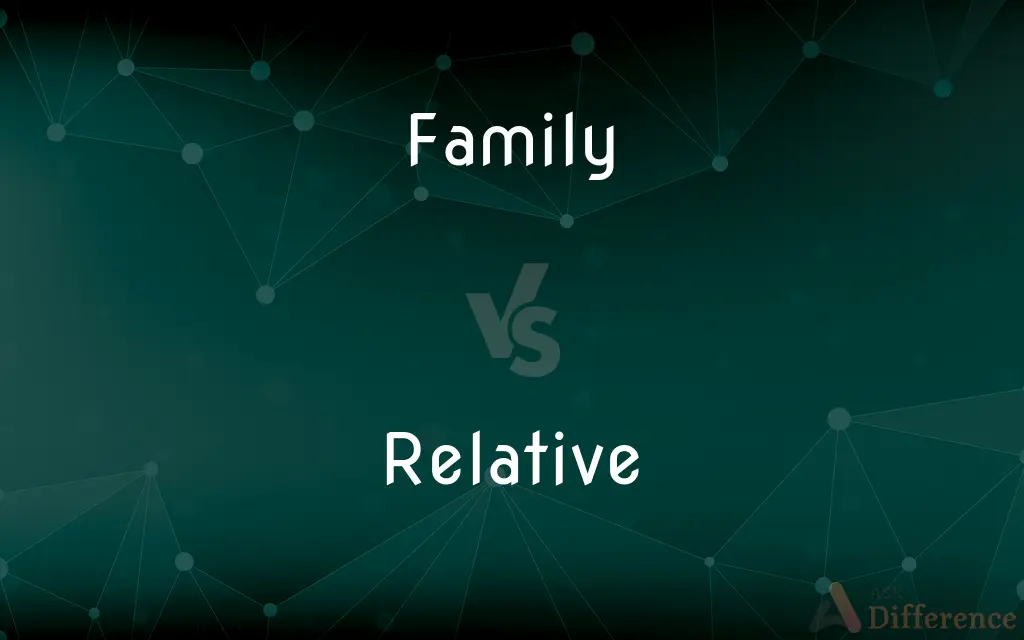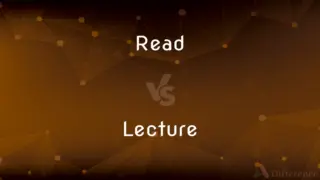Family vs. Relative — What's the Difference?
By Fiza Rafique & Urooj Arif — Updated on March 19, 2024
Family refers to a group of individuals related by blood, marriage, or adoption, while a relative is any member within this familial network.

Difference Between Family and Relative
Table of Contents
ADVERTISEMENT
Key Differences
Family encompasses a social unit that includes parents and children, as well as extended members like grandparents, aunts, and uncles, who may live together or apart. It represents the immediate and extended connections of individuals through bloodlines, marriage, or adoption, forming a foundational unit of society. Relatives, in contrast, are individuals belonging to this network, each having a specific relation to one another, such as siblings, cousins, or grandparents.
The concept of family often conveys a sense of belonging, emotional bonds, and responsibilities shared among its members. It implies a collective group that supports, nurtures, and cares for one another through various life stages. On the other hand, the term relative specifies the individual connections within this group, focusing on the personal link one has to another family member.
Families serve as the primary socialization unit for individuals, teaching social norms, values, and traditions. This unit plays a crucial role in the development of one's identity, support system, and social standing. Relatives contribute to this environment by their individual roles and interactions within the family, reinforcing the social and emotional framework established by the family unit.
The definition of family can vary widely across cultures, societies, and individual preferences, often influenced by legal, social, and cultural norms. It can include nuclear families, extended families, and chosen families. Relative, however, is a more universally understood term that identifies an individual's connection to another within the context of familial relationships, regardless of the family structure.
While the two terms are interconnected, understanding the distinction is important. "Family" refers to the collective unit or concept, embodying the idea of a bonded group, while "relative" identifies the individual links and relationships within or across family units, emphasizing the nature of each connection.
ADVERTISEMENT
Comparison Chart
Definition
A group of individuals connected by blood, marriage, or adoption.
An individual member within a family network.
Focus
On the collective unit and its emotional and social bonds.
On the individual connections and specific relationships.
Function
Serves as the primary socialization unit, imparting norms and values.
Contributes to the family dynamics and individual support systems.
Variability
Can vary in structure (nuclear, extended, chosen).
Universal concept, focusing on the personal link to the family unit.
Implications
Emphasizes belonging, support, and collective identity.
Highlights individual roles and personal connections within the family.
Compare with Definitions
Family
Represents a collective identity and shared responsibilities.
The family runs a local bakery that's been in their community for decades.
Relative
Each relative has a unique role and significance.
Grandparents often play a special role as relatives, offering wisdom and love.
Family
The primary unit of socialization and support.
Growing up, his family instilled strong values of kindness and respect.
Relative
Can extend beyond immediate family to include more distant connections.
Family gatherings are a time to catch up with relatives I rarely see.
Family
Can imply a household living together.
Their family moved to a new city for better opportunities.
Relative
Includes a wide range of familial connections.
He discovered distant relatives through a genealogy project.
Family
Encompasses nuclear, extended, and chosen families.
She considers her close friends to be part of her chosen family.
Relative
Specifies the nature of familial relationships.
As my cousin, she's not just a friend but also a relative.
Family
In human society, family (from Latin: familia) is a group of people related either by consanguinity (by recognized birth) or affinity (by marriage or other relationship). The purpose of families is to maintain the well-being of its members and of society.
Relative
Considered in relation or in proportion to something else
The relative effectiveness of the various mechanisms is not known
Family
A fundamental social group in society typically consisting of one or two parents and their children.
Relative
Denoting a pronoun, determiner, or adverb that refers to an expressed or implied antecedent and attaches a subordinate clause to it, e.g. which, who.
Family
The children of one of these groups
She raised a large family.
Relative
(of major and minor keys) having the same key signature.
Family
A group of persons related by descent or marriage
My whole family, including my cousins, gets together once a year. See Usage Note at collective noun.
Relative
(of a service rank) corresponding in grade to another in a different service.
Family
People in the same line of descent; lineage
Comes from an old Virginia family.
Relative
A relative pronoun, determiner, or adverb.
Family
(Obsolete) All the members of a household living under one roof.
Relative
A term or concept which is dependent on something else.
Family
A locally independent organized crime unit, as of the Cosa Nostra.
Relative
Considered in comparison or relation to something else
An animal with a large brain relative to body size.
The relative quiet of the suburbs.
Family
A group of like things; a class
The family of brass instruments.
Relative
Having pertinence or relevance; connected or related
How are those remarks relative to the discussion?.
Family
A group of individuals derived from a common stock
The family of human beings.
Relative
(Grammar) Referring to or qualifying an antecedent, as the pronoun who in the man who was on TV or that in the dictionary that I use.
Family
(Biology) A taxonomic category of related organisms ranking below an order and above a genus. A family usually consists of several genera.
Relative
(Music) Having the same key signature. Used of major and minor scales and keys
A minor is the relative minor of C major.
Family
(Linguistics) A group of languages descended from the same parent language, such as the Indo-European language family.
Relative
A person related to another by heredity, adoption, or marriage.
Family
(Mathematics) A set of functions or surfaces that can be generated by varying the parameters of a general equation.
Relative
A species or other taxon that shares a common ancestor, usually a relatively recent ancestor, with another
The jaguar is a relative of the lion.
Family
A group of elements with similar chemical properties.
Relative
(Grammar) A relative pronoun.
Family
A vertical column in the periodic table of elements.
Relative
Connected to or depending on something else; comparative.
Family
(Physics) Any of the three generations of elementary fermions.
Relative
Expressed in relation to another item, rather than in complete form.
Family
Of or having to do with a family
Family problems.
Relative
(grammar) Depending on an antecedent; comparative.
The words “big” and “small” are relative.
Family
Being suitable for a family
Family movies.
Relative
(music) Having the same key but differing in being major or minor.
Family
(countable) A nuclear family: a mother and father who are married and cohabiting and their child or children.
The cultural struggle is for the survival of family values against all manner of atheistic amorality.
We must preserve the family unit if we want to save civilisation!
Relative
Relevant; pertinent; related.
Relative to your earlier point about taxes, ...
Family
(uncountable) Members of one's family collectively.
I have a lot of family in Australia.
He has a sister, but no other family.
Relative
Capable to be changed by other beings or circumstance; conditional.
Family
(uncountable) Lineage, especially honorable or noble lineage.
Relative
(linguistics) A type of adjective that inflects like a relative clause, rather than a true adjective, in certain Bantu languages.
Family
A category in the classification of organisms, ranking below order and above genus; a taxon at that rank.
Magnolias belong to the family Magnoliaceae.
Relative
Having relation or reference; referring; respecting; standing in connection; pertaining; as, arguments not relative to the subject.
I'll have groundsMore relative than this.
Family
(countable) Any group or aggregation of things classed together as kindred or related from possessing in common characteristics which distinguish them from other things of the same order.
Doliracetam is a drug from the racetam family.
Relative
Arising from relation; resulting from connection with, or reference to, something else; not absolute.
Every thing sustains both an absolute and a relative capacity: an absolute, as it is such a thing, endued with such a nature; and a relative, as it is a part of the universe, and so stands in such a relations to the whole.
Family
A collection of sets, especially of subsets of a given set.
Let be a family of subsets over .
Relative
Indicating or expressing relation; refering to an antecedent; as, a relative pronoun.
Family
A group of instruments having the same basic method of tone production.
The brass family;
The violin family
Relative
Characterizing or pertaining to chords and keys, which, by reason of the identify of some of their tones, admit of a natural transition from one to the other.
Family
A group of languages believed to have descended from the same ancestral language.
The Indo-European language family;
The Afroasiatic language family
Relative
One who, or that which, relates to, or is considered in its relation to, something else; a relative object or term; one of two object or term; one of two objects directly connected by any relation.
Family
The collective body of persons who live in one house, and under one head or manager; a household, including parents, children, and servants, and, as the case may be, lodgers or boarders.
Relative
An animal or plant that bears a relationship to another (as related by common descent or by membership in the same genus)
Family
The group comprising a husband and wife and their dependent children, constituting a fundamental unit in the organization of society.
The welfare of the family underlies the welfare of society.
Relative
Not absolute or complete;
A relative stranger
Family
Those who descend from one common progenitor; a tribe, clan, or race; kindred; house; as, the human family; the family of Abraham; the father of a family.
Go ! and pretend your family is young.
Relative
Properly related in size or degree or other measurable characteristics; usually followed by `to';
Punishment oughtt to be proportional to the crime
Earnings relative to production
Family
Course of descent; genealogy; line of ancestors; lineage.
Family
Honorable descent; noble or respectable stock; as, a man of family.
Family
A group of kindred or closely related individuals; as, a family of languages; a family of States; the chlorine family.
Family
A group of organisms, either animal or vegetable, related by certain points of resemblance in structure or development, more comprehensive than a genus, because it is usually based on fewer or less pronounced points of likeness. In Zoology a family is less comprehesive than an order; in botany it is often considered the same thing as an order.
Family
A social unit living together;
He moved his family to Virginia
It was a good Christian household
I waited until the whole house was asleep
The teacher asked how many people made up his home
Family
Primary social group; parents and children;
He wanted to have a good job before starting a family
Family
People descended from a common ancestor;
His family has lived in Massachusetts since the Mayflower
Family
A collection of things sharing a common attribute;
There are two classes of detergents
Family
An association of people who share common beliefs or activities;
The message was addressed not just to employees but to every member of the company family
The church welcomed new members into its fellowship
Family
(biology) a taxonomic group containing one or more genera;
Sharks belong to the fish family
Family
A person having kinship with another or others;
He's kin
He's family
Family
A loose affiliation of gangsters in charge of organized criminal activities
Common Curiosities
Are in-laws considered relatives?
Yes, in-laws are considered relatives as they are connected through marriage, expanding the familial network.
Can pets be considered part of a family?
While pets are not relatives in the traditional sense, many people consider their pets to be integral members of their family due to the emotional bonds formed.
Why is understanding family dynamics important?
Understanding family dynamics is important for navigating relationships, emotional health, and social development, as it influences individuals' behaviors and interactions.
Can the definition of family vary?
Yes, the definition of family can vary significantly across different cultures, societies, and personal beliefs, including who is considered part of one's family.
Is it possible to have relatives one has never met?
Yes, it's common to have distant relatives or family connections that individuals may not have met or are unaware of.
How does one determine who their relatives are?
Relatives are determined by tracing familial connections through close relations, marriage, or adoption.
How do cultural traditions impact family and relative relationships?
Cultural traditions can significantly impact relationships, dictating roles, responsibilities, and the importance of family and relative connections.
How is a relative different from a family member?
A relative is a specific individual within the broader category of family members, focusing on the personal link rather than the collective unit.
Can family structures change over time?
Family structures can evolve due to various factors, including societal changes, personal choices, and life events, affecting the composition and dynamics of the family.
Do legal systems influence the definition of family and relatives?
Legal systems can influence the definition of family and relatives, affecting matters such as inheritance, custody, and marital rights.
Can adoption create new relatives?
Adoption creates new familial bonds, legally and emotionally recognizing adopted individuals as relatives within the family.
What role do relatives play in one's life?
Relatives can play various roles, including support, mentorship, and companionship, contributing to an individual's sense of identity and belonging.
How do social norms affect the concept of family and relatives?
Social norms play a significant role in shaping the concept of family and relatives, influencing expectations, roles, and the recognition of familial relationships.
Why might someone research their relatives or family history?
Researching family history or relatives can provide insights into one's heritage, cultural identity, and personal connections, offering a sense of belonging and understanding of familial legacies.
Share Your Discovery

Previous Comparison
Slogan vs. Mantra
Next Comparison
Read vs. LectureAuthor Spotlight
Written by
Fiza RafiqueFiza Rafique is a skilled content writer at AskDifference.com, where she meticulously refines and enhances written pieces. Drawing from her vast editorial expertise, Fiza ensures clarity, accuracy, and precision in every article. Passionate about language, she continually seeks to elevate the quality of content for readers worldwide.
Co-written by
Urooj ArifUrooj is a skilled content writer at Ask Difference, known for her exceptional ability to simplify complex topics into engaging and informative content. With a passion for research and a flair for clear, concise writing, she consistently delivers articles that resonate with our diverse audience.
















































